Advocates Beat 91% of Last Year's Anti-LGBTQ Bills. How?
While the trans community still faces unprecedented legislative attacks, with 49 bills passing into law in 2024, there are key strategies that activists are using to fight back.

On March 6, Montana State Representatives Zooey Zephyr and SJ Howell stood up to speak against two of the 527 anti-LGBTQ bills introduced in U.S. state legislatures this year. One bill would ban drag performances and pride marches as “hypersexualized shows,” and the other would require “the emergency removal of a child who is transitioning gender with the support of a parent” by state Child Protective Services.
“When I go to walk [my son] to school, that is not a lascivious display, that is not a fetish, that is my family. This is what these bills are trying to come after,” Zephyr, a Democratic representative and trans woman, said to the room full of Montana lawmakers, many of whom previously voted in favor of other anti-trans legislation.
To the surprise of many, Rep. Sherry Essmann, a Republican who proudly touts her “100% Conservative rating” from the Conservative Political Action Committee, joined Zephyr and Howell in their opposition.
“Stop these crazy bills that are a waste of time,” Essmann told her colleagues.
In response to the representatives’ speeches, both bills were defeated, with 13 Republicans voting “no” to the drag ban and 29 voting against the child removal bill.
This moment in Montana may seem unusual, but it’s not. Last year, only 49—less than 10%—of the 533 anti-LGBTQ bills introduced in state legislatures passed into law. None of the 46 anti-LGBTQ bills introduced in Virginia since 2022 have passed into law. And advocates in Georgia and Missouri defeated all 54 anti-LGBTQ bills introduced last year despite Republican majorities in both states.
While advocates emphasize that the 49 bills passed are unprecedented and dangerous, there are still many success stories, and reasons for hope, in the fight for trans rights.
“Every single time that any piece of anti-LGBTQ+ legislation is introduced, it causes harm,” says Vivian Topping, director of advocacy and civic engagement at Equality Federation. “When we’re able to focus on the fact that our opposition actually loses most of the time, it helps us work with our community and gives us a path forward.”
So what strategies helped defeat roughly 91% of the bills last year? Uncloseted Media spoke to advocates from red and purple states about their tactics.
Where the Work Begins: Out in the Community
According to a 2022 survey, less than half of U.S. adults know a trans person. Because of this, advocates say amplifying trans stories is central to pushing back against the bills.
“Helping people meet us on our own terms and in our own language and not in the disinformation that’s being distributed by extremists on the other side, helping them really see our lives and understand who we are, and then to understand the real material harm that would be coming from a lot of these bills, has been successful,” says Logan Casey, director of policy research at the pro-LGBTQ think tank Movement Advancement Project.
This work begins with community-level education about trans people and starting conversations between neighbors.
Last year, Missouri-based LGBTQ advocacy group PROMO launched a program for deep canvassing, an effective tactic developed in 2012 by organizers at the Los Angeles LGBT Center that focuses on having nuanced, personal conversations with community members.
“[It’s] shifting people in a place to where now they’re not just thinking about their own stakes when they’re going to cast a ballot—people are thinking about that neighbor two doors down, the loved one they haven’t spoken to in years,” says Atem Richardson, St. Louis equality organizer at PROMO.
In 2024, PROMO organizers knocked on 995 Missouri doors and had 216 conversations, 35 of which showed a marked shift in perspective.
Canvassers start the conversation by asking, “Do you think the government should control trans Missourians’ access to healthcare, on a scale of zero to ten?”
Then, over the course of a 30-minute conversation, the canvasser asks the person about their life experiences and their knowledge about trans healthcare in order to connect the issue to their life and dispel any mis- or disinformation. At the end, they ask the same question, and if the person’s score improves, they may invite them to a community meeting to educate them about trans rights.
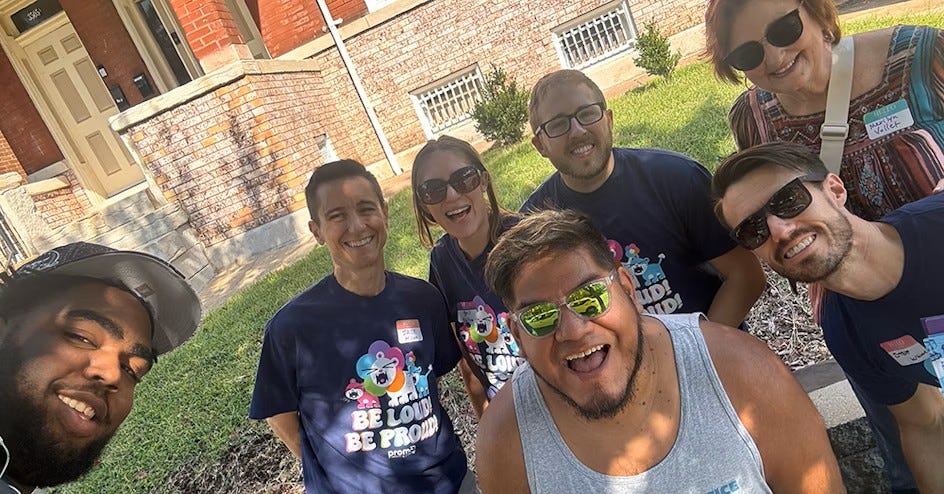
Richardson says healthcare is an effective topic because most Americans can relate to having a negative experience in this arena. For example, they remember speaking to an elderly minister at a local church who was sympathetic to access for gender-affirming healthcare because she related the topic to her daughter, who was treated with disdain by nurses before passing away due to complications from HIV.
“That moment let me know that regardless of what people believe … when life experiences happen to them … primarily because of people putting barriers in place to real resources that people need, [their beliefs] no longer mattered,” Richardson says.
“[The minister] realized, ‘I don’t want anyone else to have to bury their child because they were shamed or they were unable to access healthcare.’”
Courtney Cook, field director at PROMO, remembers knocking on the door of a supportive gay man who brought out his transphobic mother to try to get through to her. The man later contacted Cook and told her that, after she left, his whole family sat down for an in-depth conversation about trans rights for the first time ever.
“Initiating that conversation, even if the person doesn’t want to finish the conversation, even if they don’t agree with us, that opens the doors,” says Cook.
Activating New Allies
Once allies are identified, advocacy organizations direct them to resources where they can learn about anti-trans legislation and how to fight it.
Chris Berg, a father of two trans kids and a board member at Equality Virginia, says that when one of his kids came out, advocacy training helped him learn how to fight trans-exclusionary school board policies in his district. This included practicing public speaking and talking points and learning about how school board and other government meetings work.
“It’s really daunting—you go to these meetings and the room’s absolutely packed, there are people standing around the walls, there’s very angry people in the room,” Berg told Uncloseted Media. “So it was really nice to have that support from our local organizations to provide some extra background from people for whom this has been their entire career.”
PROMO recognizes that engaging in this advocacy is intense and may require support. So they started a care team of mental health professionals and social work students to help those speaking out get through their testimony. This includes providing somatic therapy and giving people ice packs, snacks and fidget toys.
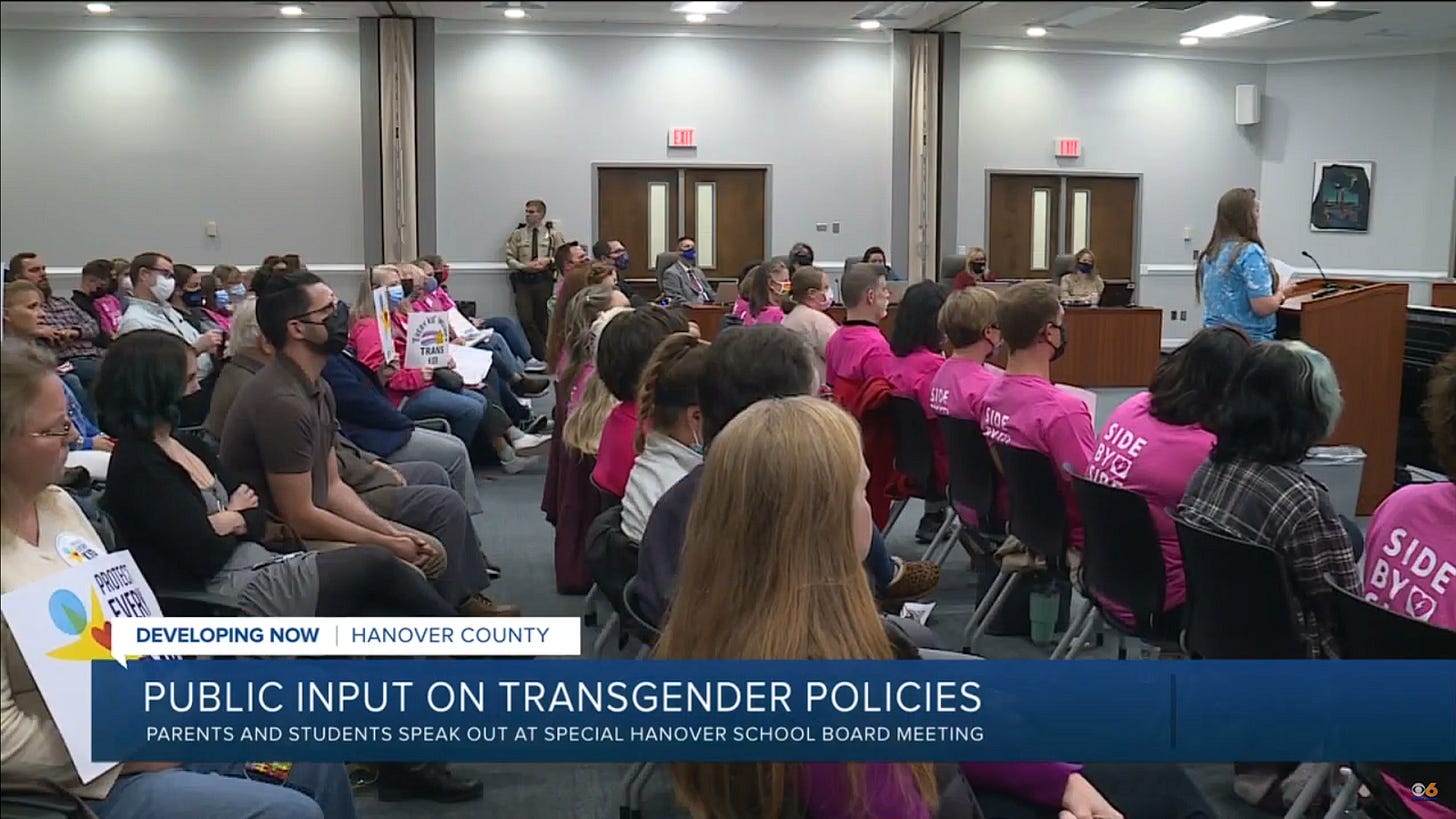
Bringing the Fight to the Legislature
Once inside the halls of government, advocates say putting trans faces front and center and introducing lawmakers to who and what they’re legislating against is critical.
This helped turn the tide in Montana. Republican representative Sherry Essmann opposed the drag ban in part because of Zephyr’s testimony about how bills like this could impact her ability to raise her kids and be seen with them in public, saying, “I’m very emotional because I know that [Rep. Zephyr] is also a parent. No matter what you think of that, she is doing her best to raise a child.”
“These kind of votes are born out of trans representation in government,” Zephyr wrote following the vote. “Rep. Howell & I have built solid relationships with Republicans and those relationships change hearts, minds, and (eventually) votes. It is painful, grueling work. But it makes a difference.”
Humanizing trans people and developing a rapport with lawmakers also led Republican governors in Arkansas, Utah and Indiana to join advocates to veto anti-trans legislation in their states. In Ohio, Governor Mike DeWine vetoed restrictions on both gender-affirming healthcare and trans girls in sports following multiple trips to children’s hospitals where he had conversations with families of trans kids.
“I’m trying to learn as much as I can to make a good decision,” DeWine said after the visits.
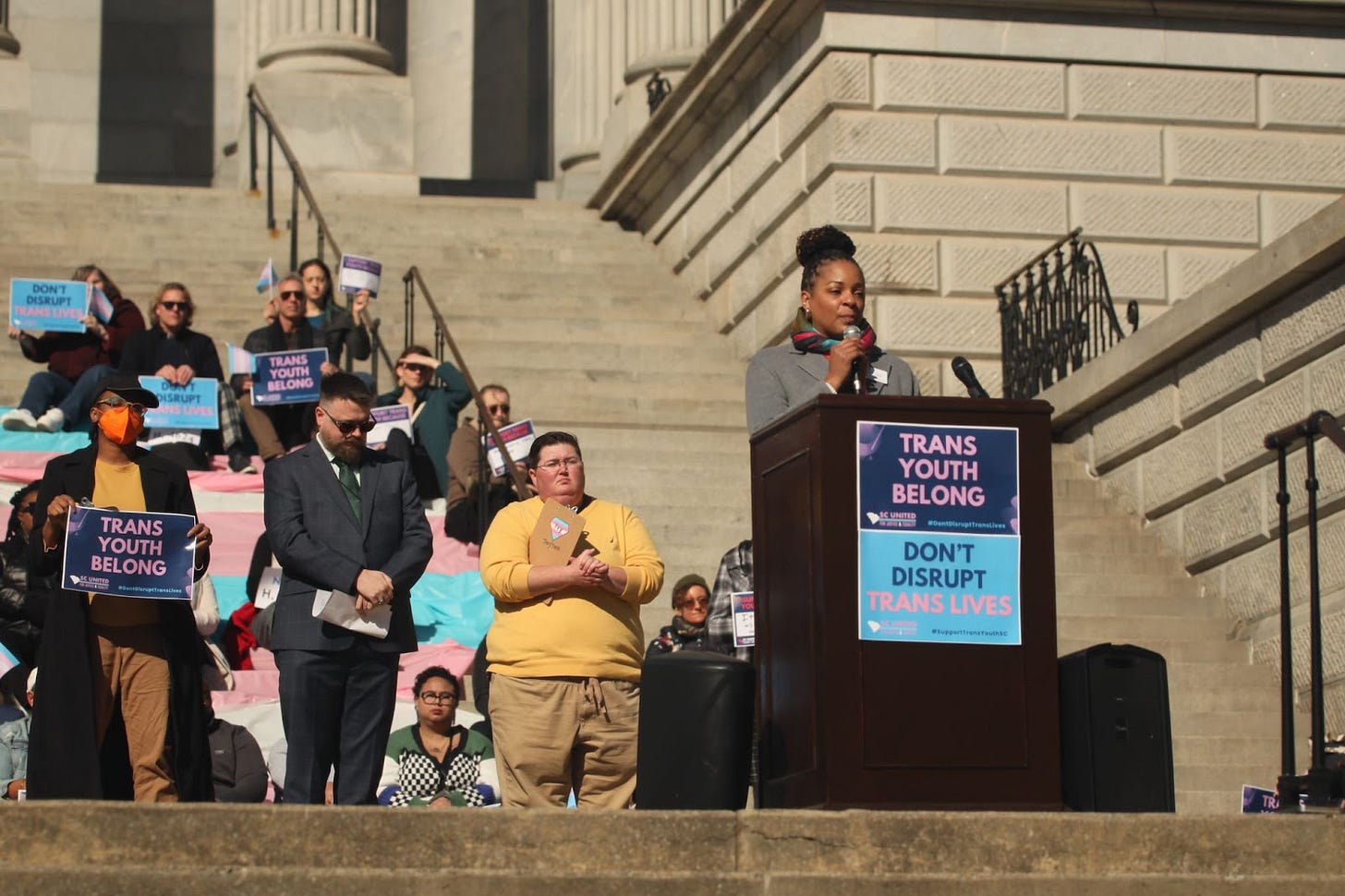
Packing the rooms with pro-trans constituents can also affect the outcome of these bills. Adam Polaski, communications and political director at the Campaign for Southern Equality, remembers packing a South Carolina legislative hearing in January 2024 on a proposed gender-affirming care ban. So many people turned out to testify against the bill—including parents of trans kids, doctors and mental health workers—that the committee ran out of time and delayed the vote.
“It does weigh on [lawmakers] when they hear stories about the ways that an anti-trans bill would hurt a constituent of theirs, a neighbor of theirs. It’s the kind of thing that you think about when you vote,” Polaski told Uncloseted Media.
And it’s not just lawmakers who can be swayed by these stories. Earlier in March, a man who showed up to testify in Wisconsin in favor of a ban on gender-affirming care for minors told the legislature that he changed his mind after hearing the stories of everyone who testified against it.
“I have very little knowledge of gay people and things like that there,” the man said in his testimony. “So, when I came here, my eyes were opened.”
Harm Reduction
With Republicans making big gains in state legislatures in 2024 alongside newfound federal support from the Trump administration, 2025 is shaping up to be one of the most aggressively anti-trans legislative sessions in American history.
Polaski says that the anti-trans movement strategically introduces more bills than it actually expects to pass to “flood the zone” and “destabilize the movement.” With defeating bills outright becoming more difficult, his group is focusing more on delaying.
“It can be discouraging that a delay can be a big win, but it’s true when you’re talking about people’s ability to really do things—it is helpful to have the bill pass a month later or six months later, because each day that trans kids are able to access their healthcare is a win,” he says.
In 2023, Nebraska state senator Machaela Cavanaugh used the state’s filibuster tactic to block the senate from passing any bills, filibustering every day of session for hours in protest of a proposed ban on gender-affirming care for minors. She ultimately delayed the passage of the bill for three months.
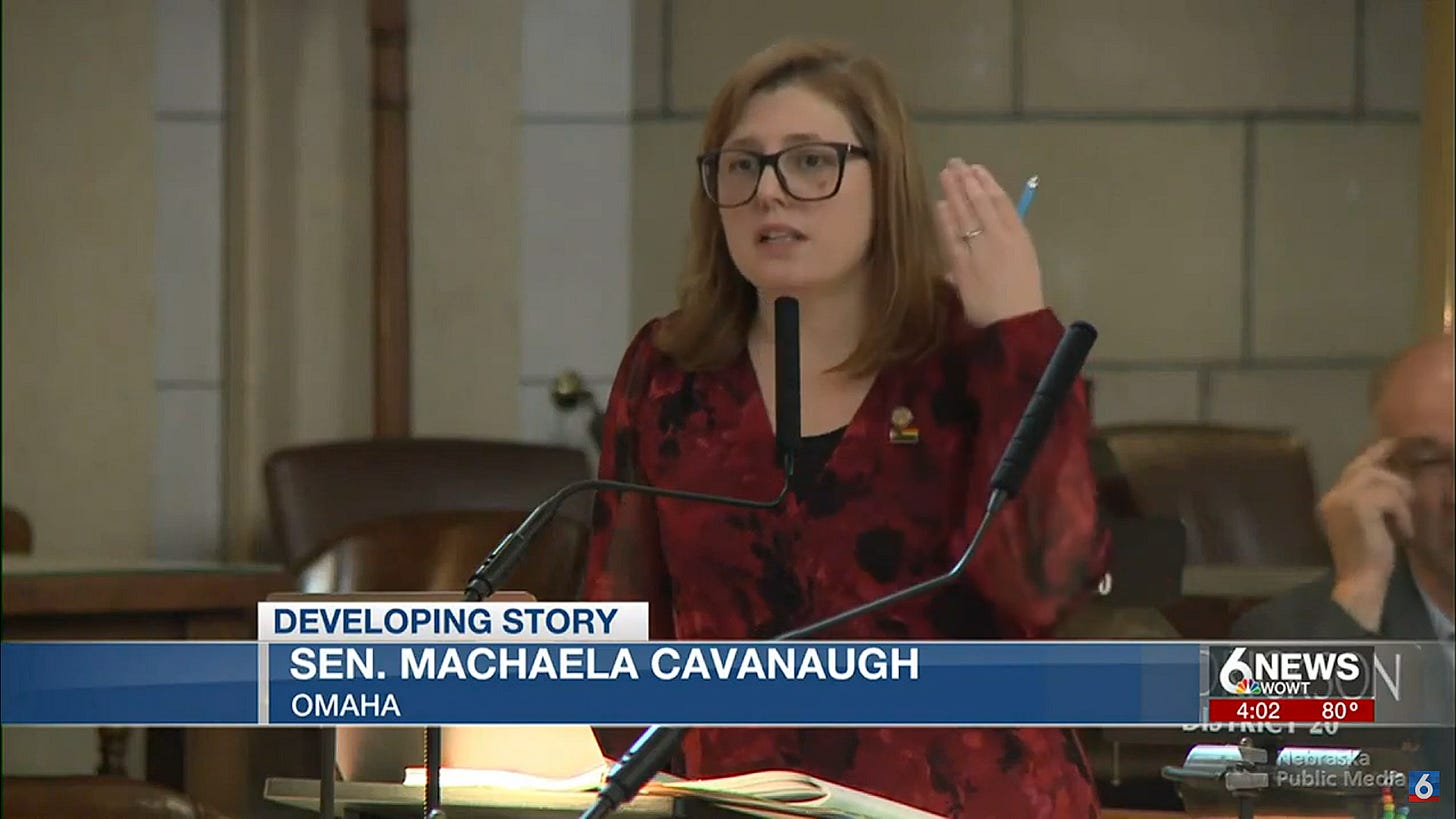
Even when bills do pass, all is not lost. In 2023, when it became clear that Missouri advocates wouldn’t be able to stop a bill restricting trans healthcare, they added a provision that will automatically take it off the books in 2027. And lawsuits by organizations like the American Civil Liberties Union have stopped anti-trans laws from being enforced in Arkansas, Montana and Ohio.
Advocates say it’s critical for blue and purple states to do their part as well. Washington, D.C. and 14 states have passed “shield laws” that protect access to gender-affirming healthcare.
And in states like Virginia that haven’t, Narissa Rahaman, executive director at Equality Virginia, says it’s doubly important for advocates to keep fighting bans for people coming from out of state.
“We hope to ensure that folks coming to Virginia from other states where care may be banned don’t face criminal penalties … [from] other states in the South, the Oklahomas, the North Carolinas, the Tennessees, that have enshrined this hatred via law,” she says.
Balancing Hope and Despair
In hard times for the trans community, Atem Richardson from PROMO says it’s important to remind people of their history and how far they’ve come—a sentiment they say—as a Black queer person—rings especially true.
“I come from a people who was once considered property, and once you have that history in you, you know you can survive almost anything,” Richardson told Uncloseted Media. “[The far right] are now making the chess moves to really attempt to place us back in a time where we had no rights. But I think the key point in that is that we were in a place where we had no rights, and we came out of it.”
When Uncloseted Media asked Equality Virginia what it needs to keep fighting, Rahaman’s answer was clear: Don’t give up, don’t resign yourself to a lost cause, but stand up for trans people even in places where it seems hopeless. Rahaman, Casey, and Richardson, all Southerners, share the same message: “Don’t write us off.”
“We need folks to join the fight,” Rahaman says. “It’s going to take all of us. We need to create an unstoppable army of advocates who can push back.”
Editor’s note: For youth in Southern states struggling to access gender-affirming care, consider visiting the Campaign for Southern Equality’s Trans Youth Emergency Project.
If objective, nonpartisan, rigorous, LGBTQ-focused journalism is important to you, please consider making a tax-deductible donation through our fiscal sponsor, Resource Impact, by clicking this button:





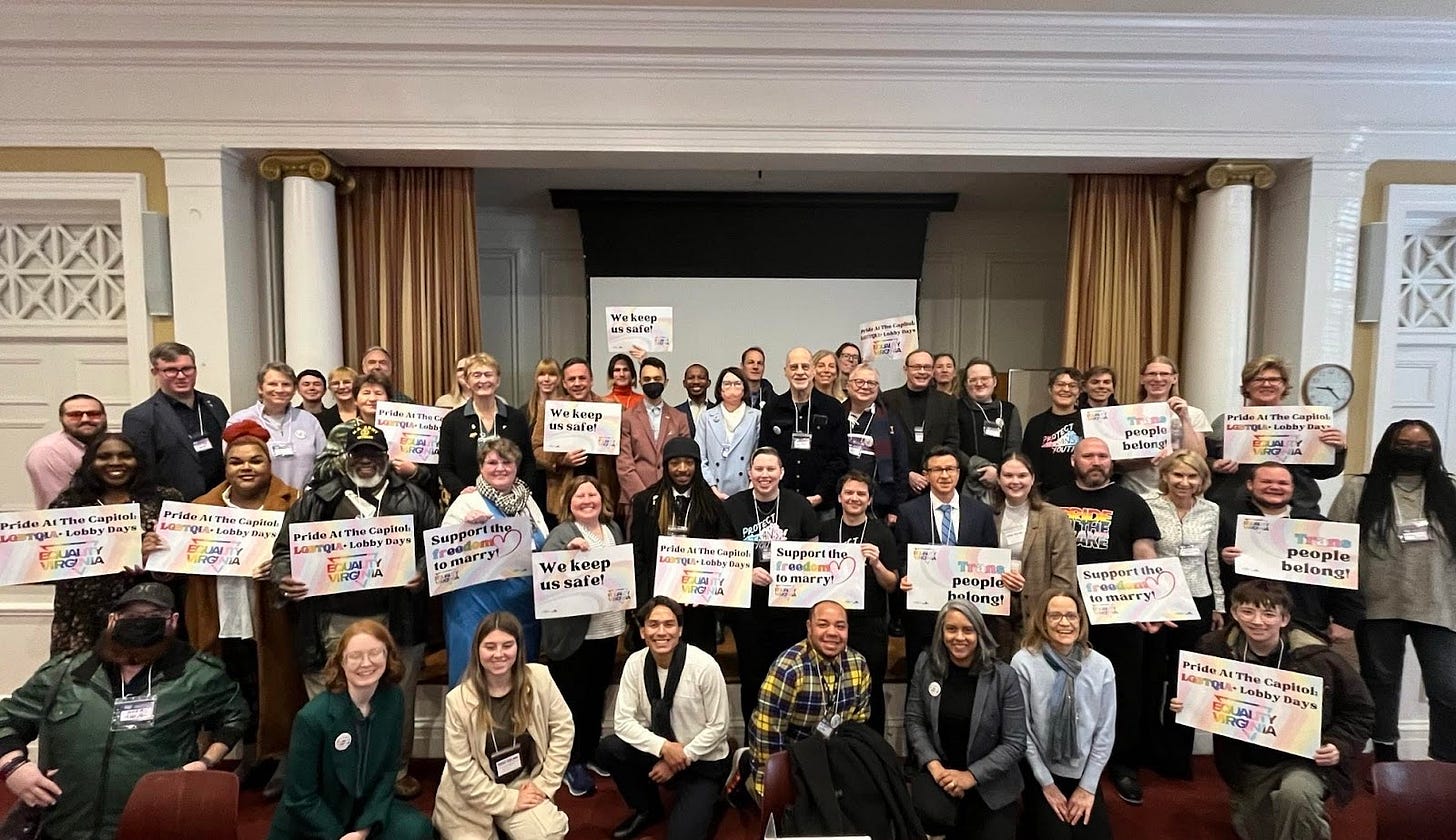

It's time to stop saying ANTI LGBTQ when we describe these attacks. They are ANTI-TRANS. And many L G and B Traitors and Supremacists within the Queer Community actively endorse what's happening to Trans folks.
So ignorant in their understanding that they lie to themselves about them being targeted next after we're gone.
We must help ourselves since no one else will.
The Democratic party refuses any meaningful help on our behalf.
The Republican party would see us a slave labor force in America's jails and prisons.
The supreme Court will soon rule against us giving us a separate set of Rights compared to other citizens and souls in America.
Do not look to institutions that hate us. Do not look to our own community that hates us. Do not look to allies who are complicit with the state targeting you.
No one is coming. We must save ourselves.
There is nothing they hate more than a man that gives up their privilege of birth. It emasculates these weak minded people in power who are only good at tearing down others on the way to the top. Humanity has always had a fluid evolution of our brains and bodies, the only reason to suppress any part of our human nature is strictly about control and having power.
The main reason being these people hate women, but need their breeding capabilities in order to win favor with Sky Daddy.